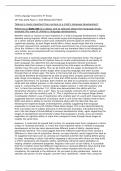Essay
Exemplar A* Child Language Acquisition Essay for 2020 AQA paper
- Module
- Child Language Acquisition
- Institution
- AQA
This is an exemplar A* essay that can be used as a reference for AQA English language, paper 1 section B- Child Language Acquisition. It is a response to the May 2020 paper- ‘Nature is more important than nurture in a child’s language development’
[Show more]



